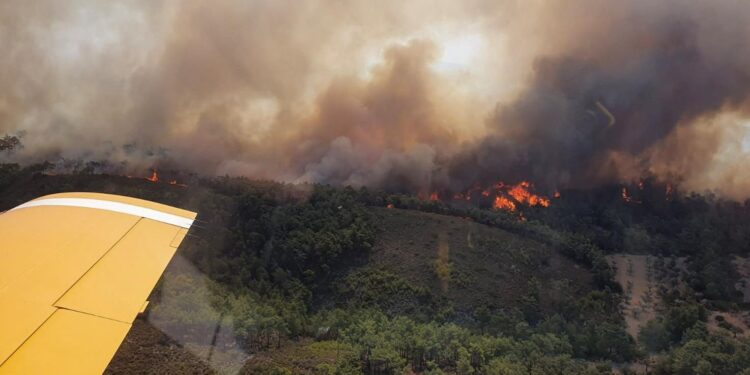Repatriation efforts have commenced to bring back more than 2,000 holidaymakers from the Greek island of Rhodes, where wildfires have been wreaking havoc for seven consecutive days. The uncontrolled fires have forced residents and tourists to seek shelter amidst the chaos caused by the blazes, which have led to the destruction of properties and hotels.
Authorities are grappling with the ongoing wildfires as the threat of further blazes remains high across Greece. The country is currently experiencing a record-breaking heatwave that has prompted the closure of archaeological sites.
Tour operators, including TUI, one of the world’s largest, have canceled upcoming trips to Rhodes and are offering free cancellations or rebookings to other destinations. The situation has impacted around 39,000 TUI customers who were on the island at the time of the fires.
As the fires continue to pose a significant danger, the Dutch foreign ministry has issued a travel warning for Rhodes, Corfu, and Evia, where other wildfires have also broken out.
The inferno, which began last Tuesday, has forced approximately 20,000 people to evacuate homes and hotels in Rhodes, reaching coastal resorts in the island’s southeast. Firefighting efforts have been relentless, with hundreds more people being evacuated on Monday and firefighting aircraft continuing to battle the flames until nightfall.
The Greek government has described this as the largest evacuation ever undertaken in the country. Prime Minister Kyriakos Mitsotakis emphasized the need for constant vigilance and stated that the climate crisis is manifesting itself across the Mediterranean with greater disasters.
The impact of the wildfires extends beyond the immediate evacuation and firefighting efforts. The devastation caused by the blazes poses a significant threat to the tourism industry, which accounts for 18% of Greece’s GDP and one in five jobs. Moody’s ratings agency warns that heatwaves could reduce southern Europe’s attractiveness as a tourist destination in the long term, affecting the region’s economy.
As repatriation flights bring relief to the stranded tourists, the focus shifts to recovery and reconstruction efforts, requiring international support and resources to rebuild the affected areas and ensure their resilience against future climate-related disasters.










